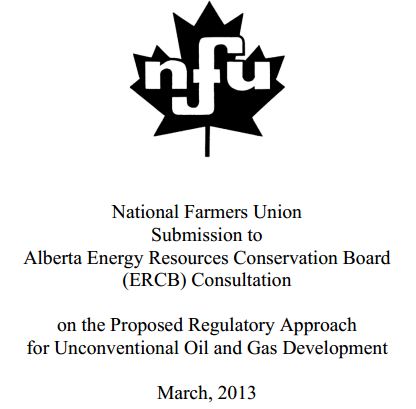Precautionary Principle Should Guide New Fracking Regulations, says NFU by The National Farmers Union, March 18, 2013
(Rimby, AB) – “There are serious gaps in the regulation of fracking in every jurisdiction, and Alberta is no exception,” said Jan Slomp, National Farmers Union Region 7 (Alberta) Board Member. “That is why we have recommended that the Energy Resources Conservation Board adopt the Precautionary Principle as its ultimate guiding principle.” “This new technology is extremely powerful, and may well be unprecedented in the scope and duration of its impacts,” Slomp continued. “The ability of the industry itself to fully understand its implications is limited. Regulators must ensure that the first priority is to protect our land, water, air and soil. This is why we have submitted our recommendations to the ERCB.”
“As farmers, we bear the brunt of fracking’s impacts,” Slomp emphasized. “My family has to live with the noise, light, dust, traffic and gases emitted from fracking operations day after day. Fracking infrastructure has turned our fields into an obstacle course. We and our neighbours use wells for our own drinking water, for our livestock and to irrigate our produce. The threat of having them irreversibly polluted by fugitive fracking fluids hangs over our heads.”
“Farmers depend upon clean water in our lakes, streams and rivers as direct sources of water and also to recharge the underground aquifers. If spills or improper disposal of produced water contaminate these waters, our land is affected forever,” stated Doug Scott, NFU Board member and Waskatenau-area farmer. “If these water sources are depleted, it is we who will have to haul water for our farms – or leave. Worse, within decades the oil and gas will be gone, and the land and water could be spoiled forever by irresponsible and reckless fracking.” “We look forward to seeing that improvements that will result from implementing public-interest recommendations such as ours to strengthen Alberta’s regulatory framework,” concluded Scott. [Emphasis added]
– 30 –
For more information:
Jan Slomp, NFU Region 7 (Alberta) Board Member: (403) 843-2068
Doug Scott, NFU Region 7 (Alberta) Board Member: (780) 650-1336
Submission to ERCB on Fracking Regulation by The National Farmers Union
The National Farmers Union has submitted feedback to the Alberta Energy Resources Conservation Board (ERCB) Consultation on its Proposed Regulatory Approach for Unconventional Oil and Gas Development.
The use of horizontal drilling and hydraulic fracturing in the oil and gas industry already had a significant effect on agriculture and farmers in Alberta. As the ERCB states, “Since 2008, approximately 5,000 horizontal wells have been drilled in Alberta using multi-stage hydraulic fracturing to enhance oil and gas recovery.” With the projected growth of unconventional resource extraction, the NFU agrees that a thorough and strictly-enforced regulatory regime is necessary to prevent serious harm.
The adverse impacts of horizontal drilling and hydraulic fracturing, commonly known as fracking, include increases in noise, dust, light pollution, air pollution, traffic on and damage to country roads, damage to fields, loss of productive acres, interference with wildlife habitat, social impacts due to influx of transitory workers, loss of recreation opportunities, potential water shortages, chemical spills on farmland and into surface waters, and reduction in property values. The danger of irreversible contamination of groundwater and resulting loss of wells used for watering livestock, irrigating crops and domestic consumption is our most serious concern.
In many ways, fracking is not compatible with the safe, healthy production of wholesome food. If fracking is to be done, it must be carried out with extreme care by operators and with effective, impartial oversight strictly enforced by a regulatory body that makes the health of Albertans and our environment the top priority. We submit our comments in this spirit.
Read the full brief for the detailed explanation and rationale for our recommendations.
The NFU recommends:
– the Precautionary Principle be the overarching principle that informs the regulations.
– protection of farmland, health, wildlife, biodiversity, and recreation values be added to the outcomes included in the ERCB’s regulatory mandate.
– the due diligence defence be eliminated, or at a minimum, limit the defence by creating a two-tier regulatory scheme that imposes absolute liability for administrative penalties and strict liability for criminal prosecutions.
– administrative penalties accurately reflect potential damage. Require fracking operators to provide security deposits sufficient to clean up groundwater pollution and pay substantial fines or damages.
– citizens be explicitly permitted to prosecute fracking operators for statutory violations where the Crown is unwilling to do so.
– no regulatory authority be delegated to industry.
– companies be required to include a tracer in their fracking fluids so any potential groundwater contamination can be easily linked to a specific fracking operation.
– individuals directing fracking operations are held personally liable for statutory and/or common-law violations.
– freshwater-bearing geological formations are excluded from drilling altogether: if a play is situated below such an aquifer it should be off-limits for fracking.
“affected parties” be interpreted broadly so that all who believe they are affected can make their case and present evidence. [Emphasis added]

